On the afternoon of September 29, at the 8th full-time National Assembly Deputies' Conference of the 15th tenure, the draft law amending and supplementing a number of articles of the Law on Education was brought up for discussion.
MINISTER OF EDUCATION AND TRAINING APPROVED THE TEXTBOOK
The policy of ensuring the provision of a unified set of textbooks nationwide in Resolution 71 of the Politburo has been included in this draft Law on Education. Specifically, the draft law states: "The State provides a unified set of textbooks for nationwide use, ensuring fairness in access to education, quality, modernity, and conformity with educational goals. The Government regulates free textbooks for students; implements appropriate socialization solutions for textbooks, ensuring sustainability and meeting the requirements of improving the quality of education".
The National Textbook Appraisal Council is regulated and established by the Minister of Education and Training for each subject and educational activity at each level and class to appraise textbooks. The Council and its members are responsible for the content and quality of the appraisal.
Also according to the draft law, the Minister of Education and Training approves textbooks for use in general education institutions after they are appraised and classified by the National Council for Textbook Appraisal; and prescribes standards and procedures for compiling and editing general education textbooks.
Minister Nguyen Kim Son said that the high school graduation exam is still very necessary at this time.
PHOTO: NATIONAL ASSEMBLY PORTAL
Meanwhile, the current Education Law stipulates: "Each subject has one or several textbooks; the compilation of textbooks is socialized; the Provincial People's Committee decides on the selection of textbooks for stable use in general education institutions in the area according to regulations of the Minister of Education and Training".
Regarding local educational materials, the draft law stipulates that specialized agencies under the provincial People's Committees shall organize the compilation of local educational materials that meet the needs and are suitable to the characteristics of the locality, which shall be appraised by the provincial appraisal council and approved by the provincial People's Committee Chairman.
The local educational materials appraisal council is established by decision of the provincial People's Committee Chairman. The council and its members are responsible for the content and quality of appraisal; the Minister of Education and Training prescribes the standards and procedures for compiling, editing and appraising local educational materials. This is a significant change compared to the current law where local educational materials are compiled by the provincial People's Committee and approved by the Minister of Education and Training.
At the conference, many delegates expressed their agreement on the need for a unified set of textbooks to be used nationwide. However, there were also suggestions that stricter regulations on textbook appraisal procedures should be put in place to avoid possible negative consequences. Delegate Nguyen Thu Ha ( Hue City) suggested that the roadmap for free textbooks and the accompanying resources should be clarified.
Candidates for high school graduation exam in 2025
Photo: Nhat Thinh
HIGH SCHOOL GRADUATION EXAM: "STILL VERY NECESSARY"
Regulations on diplomas, certificates, draft law abolishing junior high school diploma and keeping high school diploma. Specifically: "Students who have completed primary school and junior high school programs and meet the requirements set by the Minister of Education and Training will have their transcripts confirmed by the school principal as having completed primary school and junior high school programs.
Students who complete the high school program and meet the requirements prescribed by the Minister of Education and Training are allowed to take the exam. If they meet the requirements, they will be awarded a high school diploma by the school principal. In case students do not take the exam or do not meet the requirements, they will be awarded a certificate of completion of the general education program by the school principal.
Many people agree with the abolition of the junior high school graduation certificate, but are concerned about whether to keep the high school graduation exam or not. National Assembly member Tran Van Lam (Bac Ninh) said that there are currently conflicting opinions on whether to take the exam or not to consider high school graduation. Therefore, Mr. Lam suggested that the drafting and reviewing agencies need to carefully evaluate and analyze the advantages and disadvantages of each option, so that on that basis, National Assembly members will consider and decide.
According to Delegate Lam, whether or not there is a high school graduation exam, the ultimate goal is to improve the quality and effectiveness of education. If eliminating the exam still ensures effective output, it should be considered.
Delegate Nguyen Van Huy (Hung Yen) believes that abolishing the junior high school diploma and assigning principals and leaders to confirm program completion is appropriate. Issuing junior high school diplomas is unnecessary, causing additional administrative procedures, and avoiding the mentality of having a diploma after finishing grade 9, leading to early stopping of school, not continuing to high school or vocational training.
However, according to this delegate, in some difficult rural areas, the junior high school diploma is still considered a necessary document for employment. It should be replaced by a certificate or electronic data showing that the learner has completed junior high school.
Speaking at the conference, Minister of Education and Training Nguyen Kim Son affirmed that "at this time, maintaining the high school graduation exam is very necessary". According to Mr. Son, the organization of the high school graduation exam for graduation recognition currently has very specific goals, including: assessing the level of learners according to the requirements for developing qualities and abilities of the general education program, and using exam results to consider high school graduation recognition.
The exam results are also used as one of the bases to evaluate the teaching quality of general education institutions and the direction of educational management agencies.
In addition, the exam not only provides reliable data for universities and vocational training institutions to use in enrollment but also to assess the level of general education standards, providing national data for research, development and adjustment of general education policies. At the same time, it assesses the quality of education in regions across the country.
The State provides a set of textbooks for unified use nationwide, ensuring fairness in access to education, quality, modernity, and suitability with educational goals.
Photo: Dao Ngoc Thach
SUPPLEMENTARY DIPLOMA IN ELECTRONIC OR DIGITAL FORM
The draft law also adds the provision: "Diplomas of the national education system are documents in paper, electronic or digital form...".
In the draft Education Law submission, the Ministry of Education and Training explained that the current Education Law does not recognize the form of electronic or digital diplomas and certificates, while the trend of digital transformation and online learning management is increasingly popular. On the other hand, the regulation of junior high school diplomas does not ensure compliance with the current goal of universal education, while the international trend is not to issue junior high school diplomas but to use the principal's confirmation of learning results in lower grades to consider studying at higher levels or to stream. These limitations make the legal system unable to keep up with the requirements of modernization, international integration and transparent and safe management in the digital environment.
Extending compulsory education to secondary school
The draft law amends and supplements regulations on universal education and compulsory education. According to the Ministry of Education and Training, the current law stipulating compulsory education only at the primary level does not meet the requirements of improving the quality of human resources and does not ensure the completion of the goal of sustainable universalization, because the situation of students dropping out of primary school still occurs. The current regulation only universalizing preschool for 5-year-old children is not consistent with the new resolution of the National Assembly on universalizing preschool education, causing a lack of consistency in implementation.
These limitations show the need for amendments to expand compulsory education to lower secondary school and universalize preschool education for children aged 3-5, ensuring fairness, consistency and conformity with current educational development orientations.
University arrangement needs to pay attention to the teaching staff
Commenting on the draft law amending and supplementing the Law on University Education, delegate Bui Thi Quynh Tho (Da Nang) suggested that regulations on the establishment, merger and separation of university education institutions should have principles and accompanying decrees to ensure the rights of teachers and workers. According to Ms. Tho, this is an issue that is causing concern for teachers in many schools.
Ms. Quynh Tho also suggested that when abolishing the university council, there should be regulations and transitional provisions on how the current position of university council chairman will be handled when the law is passed and comes into effect.
Minister Nguyen Kim Son accepted these proposals and said the drafting committee will consider adding them appropriately in the next draft.
Source: https://thanhnien.vn/sua-luat-giao-duc-quy-dinh-ve-sgk-bang-cap-se-thay-doi-ra-sao-185250929224456875.htm


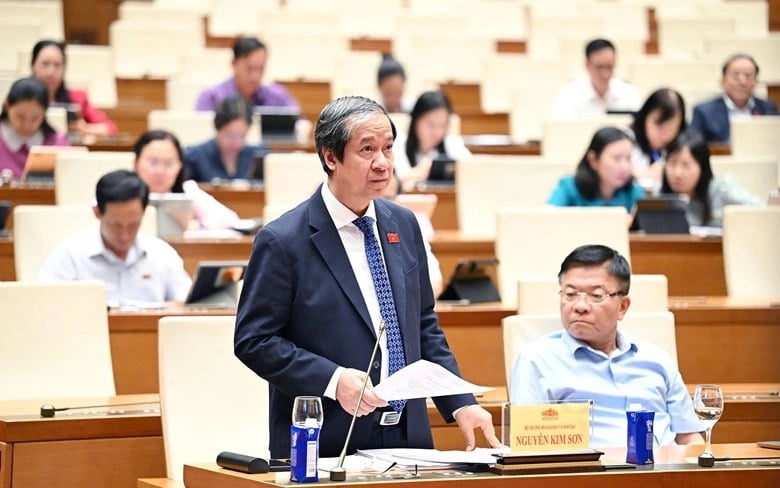
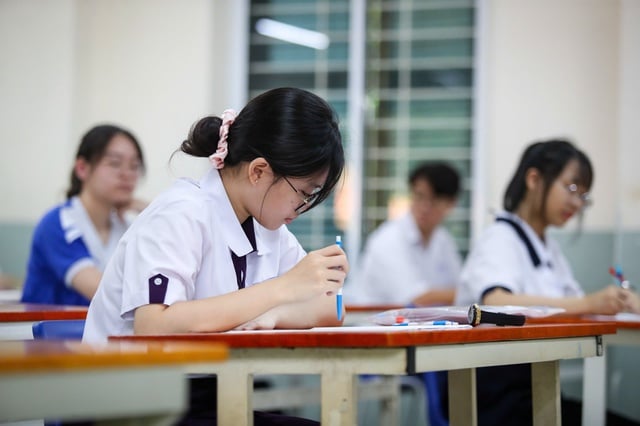
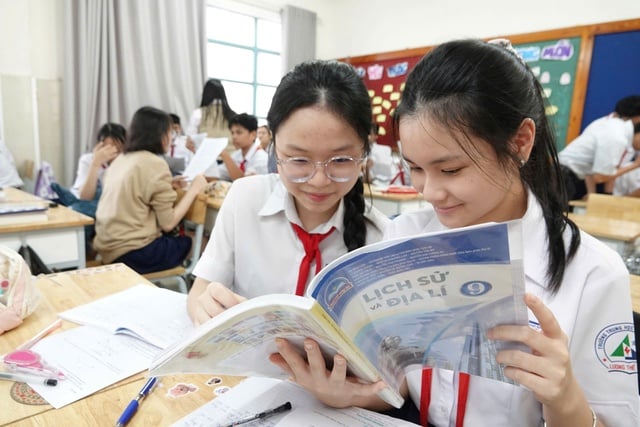


![[Photo] General Secretary To Lam receives Vice President of Luxshare-ICT Group (China)](https://vphoto.vietnam.vn/thumb/1200x675/vietnam/resource/IMAGE/2025/11/15/1763211137119_a1-bnd-7809-8939-jpg.webp)
![[Photo] Prime Minister Pham Minh Chinh meets with representatives of outstanding teachers](https://vphoto.vietnam.vn/thumb/1200x675/vietnam/resource/IMAGE/2025/11/15/1763215934276_dsc-0578-jpg.webp)


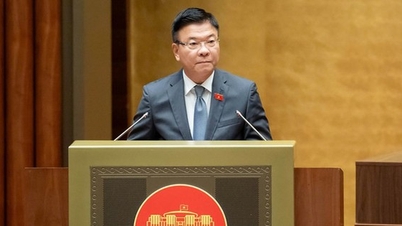

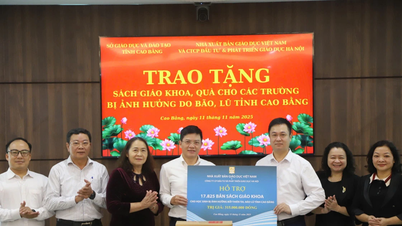




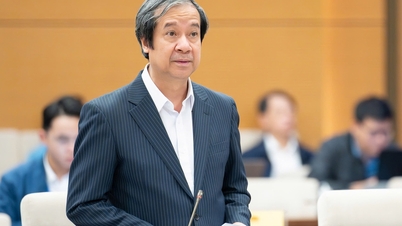









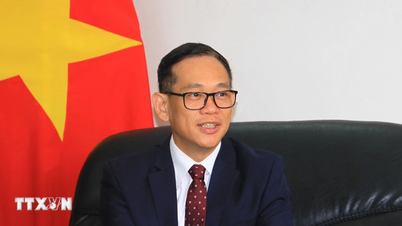


































































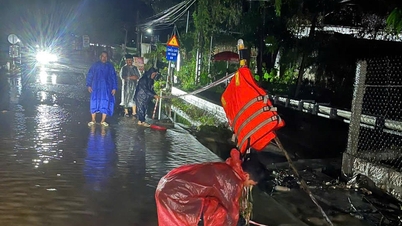












Comment (0)